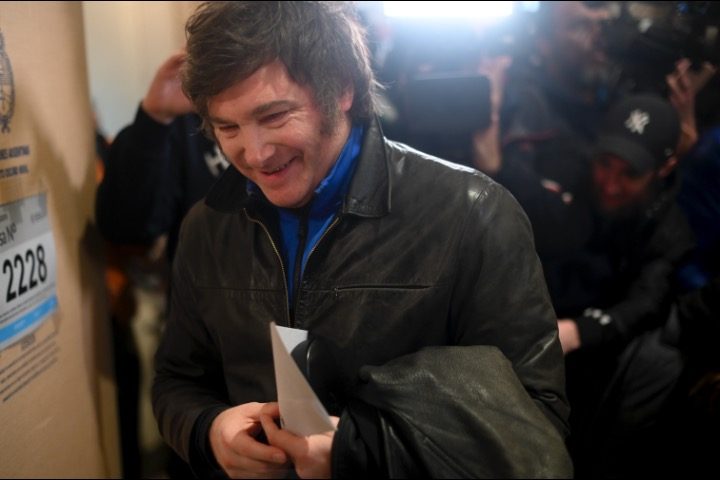
The days of Argentina’s closeness to Beijing may be numbered.
The front-runner in the Argentine presidential race, right-winger Javier Milei, said in a recent interview with Bloomberg News that he would pull back from the country’s recent friendliness with China, vowing to “not promote relations with communists.”
Milei gained front-runner status on August 12 when he won the national primary by 30 percent more than his nearest rival. In the Argentine electoral system, all candidates for the presidency are put on a primary ballot and must get at least 1.5 percent of the votes to qualify for the official ballot. This election is scheduled for October 22.
Milei’s ascension sent shockwaves throughout Latin America. Should he win, it would represent a major shake-up for Argentine politics, which has a long history of leftism. The La Libertad Avanza (“Liberty Advances”) coalition of right-wing parties that Milei leads has a limited-government, pro-free-market platform strongly reminiscent of U.S. conservatism — something rarely seen in Latina American politics.
La Libertad Avanza, for example, like some Republicans, conservatives, and libertarians in the United States, opposed draconian government restrictions amid the Covid-19 outbreak. Milei denies the existence of global warming, wants to ban abortion, advocates privatizing state businesses and dissolving the Central Bank of Argentina, and is a supporter of Jair Bolsonaro of Brazil and Donald Trump of the United States.
Breitbart News described the shape of the Argentine presidential race:
Milei will face off against establishment center-right candidate Patricia Bullrich, who came in second place, and socialist current Economy Minister Sergio Massa, a former failed presidential candidate. Current hardline socialist President Alberto Fernández chose not to run for reelection.
Under Fernández’ socialist leadership, Argentina has made a major shift in the sphere of foreign relations, unabashedly aligning itself with Communist China. Fernández joined his country to China’s Belt and Road Initiative (BRI), a scheme by which Beijing is trapping money-strapped nations into being indebted to it, in February of 2022.
As The New American previously reported, Argentina under Fernández began trading with China using the yuan rather than the U.S. dollar. The currency swap agreement permits Argentinian exporters to transact yuan or dollars to balance the flows of foreign currencies in the central bank.
In addition, Argentina earlier this year was considering buying fighter jets from China before the U.S. stepped in and offered to sell it military hardware. Back in March, a social media post from Argentina’s embassy to China revealed that Ambassador Sabino Vaca Narvaja and Argentine Defense Minister Jorge Taiana are in the process of working out a defense integration with China that would prospectively include buying Chinese military vehicles and fighter jets, and even engaging in a exchanges of military personnel with Beijing.
The closeness with China has been not only ideological, but driven by economic interest.
As The New American’s Angeline Tan notes:
Following a trying period of drought that has evaporated around $20 billion in agricultural exports from its economy compared to 2022, amounting to about $7.4 billion in lost government revenue as indicated by the Rosario Board of Trade, Argentina’s economic situation has not been rosy. Furthermore, an article in Forbes stated that as the country’s Central Bank led by Miguel Ángel Pesce had to sell $3 billion in the first quarter of this year to control the peso-dollar exchange rate, worries over a potential default have increased together with a depletion of the Central Bank’s reserves.
On April 27, Argentina’s central bank increased its benchmark interest rate a huge 10 percentage points to 91 percent to curb high inflation and stabilize the peso, which has seen a nosedive in black market trading over the last week.
Moreover, China is presently Argentina’s second-largest trading partner, after Brazil, and the second-largest destination for Argentinian exports. In 2021, Argentina’s total imports from China amounted to around $13.5 billion, based on the UN database on international trade.
If Milei wins, he says he will likely undo much of Fernández’ China policy and instead align Argentina more closely with the United States.
“Our fundamental bases are free trade, peace, freedom, and aligning ourselves with the West, where the top references in this for us are the U.S. and Israel,” Milei told Bloomberg. Asked about trade with Beijing, the presidential contender responded, “Well, they will be commercial partners in the private sector. We don’t make deals with communists.”
“I would not promote relations with communists – not with Cuba, not with Venezuela, not with North Korea, not with Nicaragua, not with China,” he added.
“People are not free in China, they can’t do what they want and when they do it, they get killed,” Milei went on to say. “Would you trade with a murderer?”
If Milei pulls out a victory in October, it could spark the beginning of a new era not only for Argentina, but for all of Latin America, which has increasingly become an important battleground in the rivalry between the United States and China.




